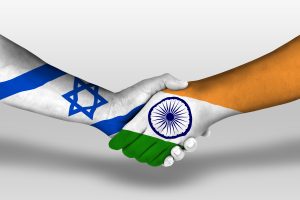Amid a severe labor crisis prompting Israel to seek a workforce in Asia, India is emerging as a significant supplier. Recent reports reveal bilateral agreements between the two nations aimed at facilitating population mobility, paving the way for an influx of Indian workers into Israel under a government-to-government (G2G) framework. Through the deal, Israel is aiming to bring in 100,000 Indian workers.
In essence, Israel’s need for labor finds a viable answer in India’s workforce, while India seizes the opportunity to alleviate domestic unemployment by offering employment opportunities abroad and receiving inward remittances.
To be sure, this initiative underscores India’s growing interest in using labor as a tool for fostering diplomatic relations and cooperation between countries. India has also signed memoranda of understanding (MoUs) on migrant labor with Japan and Taiwan in recent years. However, while this labor diplomacy promises mutual benefits, current collaboration between Israel and India largely stems from the strengthening political partnership between the two nations, particularly under the guidance of Prime Ministers Narendra Modi and Benjamin Netanyahu.
India’s de-hyphenation of the Israel-Palestine issue, coupled with high-level visits, has marked a policy of open embrace toward Israel. Currently, the ongoing conflict in Gaza acts as a catalyst for new migration dynamics, contributing to the strengthening of the relationship between India and Israel.
However, the synergy to explore labor migration also offers political gains for both nations.
First, this new population mobility for the first time evinces tremendous potential for a strong people-to-people connection fostering India-Israel relations. Traditionally, such connections between India and Israel have not been as robust as they could be, despite the historical presence of a Jewish population in India. India’s policy of non-alignment during the Cold War era constrained engagement with Israel, while geopolitical factors, including support for the Palestinian cause and relations with Arab nations, also played a role in shaping the relationship. Additionally, domestic political concerns, such as the negative perception of Israel persisting since independence, have all contributed to Indians not seeing Israel as a desirable destination for employment opportunities.
Nonetheless, in the present day, there exists abundant scope and feasibility for fostering successful people-to-people connections. Modi’s tenure in India has witnessed a discernible shift in public sentiment toward Israel, marked by a burgeoning positivity. A significant portion of the Indian population holds Israel in high regard, appreciating its military strength, intelligence capabilities, and adept handling of existential challenges. The substantial support for Israel in the ongoing conflict serves as a noteworthy example of this trend. Similarly, the Israeli public also views India favorably. According to a recent survey by the Pew Research Center, a remarkable 71 percent of Israelis hold positive opinions of India, marking Israel as the country with the highest regard for India.
Second, the labor agreement signifies the potential emergence of a newly robust Indian diaspora in the Middle East region, highlighting the continuity of the ruling Bharatiya Janata Party’s commitment to expanding and fortifying diasporic connections. Under Modi, India has actively pursued the cultivation of diaspora communities, exemplified by intensified outreach aimed at fostering a sense of belonging, collective memory, and enduring ties with expatriate communities worldwide.
Although the current count of about 18,000 Indians working in Israel pales in comparison to India’s diaspora in the Gulf, Indian Jews who have migrated to Israel have contributed to the diversity of the Indian diaspora in the country. The increase in Indian expatriates in Israel through the current deal will only serve to further bolster their numbers.
It should be noted that these diaspora members are not mere spectators; they are dynamic agents carrying the essence of India’s vibrant culture and narrative wherever they go. As torchbearers of India’s image and story of growth and progress, they wield significant influence in advocating for their homeland’s interests and achievements on the global stage.
Third, for Israel, labor migration from India not only addresses workforce needs but also presents an opportunity for strategic public diplomacy. Given the ongoing challenges stemming from the Palestinian question, enhancing Israel’s reputation on the world stage is paramount. Migrants could serve as a means to bolster public support and cultivate a positive global image, as migration facilitates the development of social ties and bonds between people, which are crucial for effective public diplomacy. Prominent public diplomacy scholars Nicholas Cull and Nancy Snow note that “public diplomacy relies on the bonds of ordinary people.”
In this context, Israel seems to be exploring the opportunity to harness the positive public sentiment toward the country among Indians, transforming it into a dedicated labor force that can also serve as effective ambassadors for public diplomacy. Indeed, a growing Indian diaspora in Israel could foster an environment conducive to the exchange of experiences and perspectives. Such diasporas are likely to be more inclined to promote a favorable view of the country, given the promising job prospects and livelihood opportunities in Israel’s stable and prosperous environment.
The vocal support for Israel demonstrated by migrants from Kerala residing in the country during the conflict sparked by the Hamas attack on October 7 underscores the potential of public diplomacy through population mobility. This suggests that an expanding Indian diaspora in Israel could play a significant role in shaping and strengthening positive perceptions of Israel within India and elsewhere through their strong networks and active presence on social media.
































